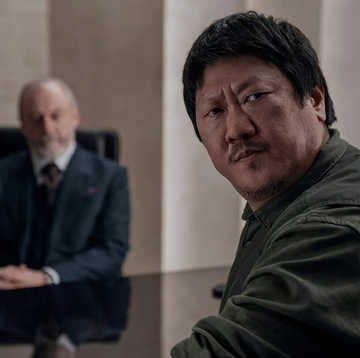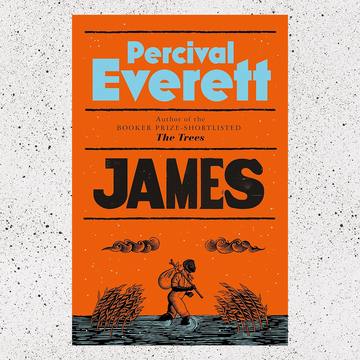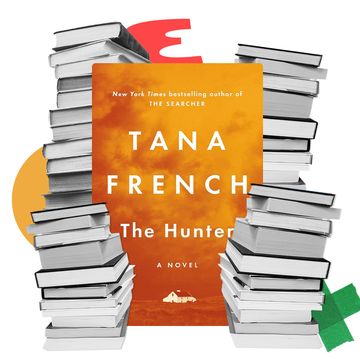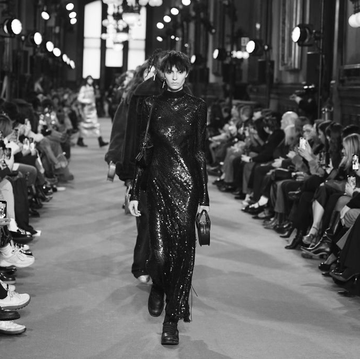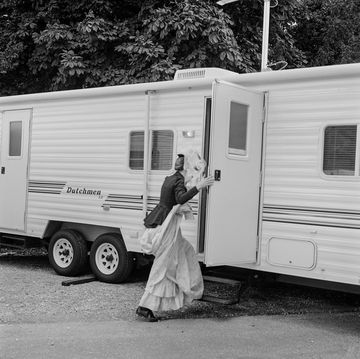Every few years a novel comes along and has a ‘public transport moment’, when it feels like every time you step onto a train or bus you see someone with their face buried behind its cover.
Irish writer Sally Rooney has, remarkably, had two such moments in as many years, first with her 2017 debut Conversations with Friends and then with this summer's follow-up Normal People, both of which quickly acquired the status of must-reads - and must-be-seen-to-reads - particularly among people who, like Rooney herself, are in their 20s.
Rooney’s style – detached but intimate, set, it sometimes feels, to a steady, underlying pulse of anxiety – has seen her quickly acquire burdensome labels like ‘a spokesperson for millennials’ and ‘the Snapchat Salinger’. Certainly, her deceptively simple prose made both Conversations and Normal People not so much read-able as devour-able, with many fans tweeting how they finished each novel in a single sitting. And there is something - perhaps the way she makes the internet feels like an authentic part of the fabric of her stories rather than a Great Topic to be conquered by Fiction - that feels fresh and important.
In Normal People, Marianne and Connell, two young adults from different class backgrounds, go through high school and then college, shifting gears between lovers and friends, making difficult discoveries about sex, family and mental health. Like all great novels it is beautifully observed, and like its predecessor crackles with vivid insight into what it means to be young and in love today. Longlisted for the Booker Prize, it was this month named the 2018 Waterstones Book of the Year.
In the summer, when everyone you knew was reading and discussing Normal People, we spoke with the 27-year-old about the pressures of early success, how growing up with social media has helped shape her writing, and what the novel has to say about, among other things, masculinity in 2018.
You’ve been labelled as a ‘spokesperson for millennials’. What do you make of that?
I did see the ‘voice of a generation’ thing. I mean, that’s very hard to take. I don’t really want people to read my book that way, because I never intended it. I don’t want to sound ungrateful, because they’re saying nice things, but I’m not trying to be a voice for even a small fraction of a generation - not even young women of my generation, or Irish women of my generation. Really, it’s just me.
Conversations With Friends is, primarily, about female characters. In Normal People you write very intimately from the perspective of a young man (Connell). How was that?
I loved writing from Connell’s perspective. Oddly enough, it made me think about gender in a different way. I feel gender is basically a social system - a set of rules and expectations you basically learn to comply with in childhood, whether you personally feel an affinity with them or not. From that perspective, I thought: ‘I understand that Connell would interact with those rules and expectations, as at the end of the day he’s just a vulnerable human being’. This code of masculinity has been imposed on him. It doesn’t fully define his experience of being alive. To me, that’s the interesting stuff: the gap between gender expectations and the reality of people’s lives.
In one passage, set midway through their relationship, Connell suddenly feels he could hit Marianne and get away with it. It struck me he was experiencing a sort of panic attack, or at least a moment of heightened anxiety...
Yeah, I think so. He’s noticing something in their power dynamic that he’s never noticed before. He feels this sense of having the upper hand, and then he suddenly sees it’s like an endless tunnel - it could keep going, this power over her. It scares him. Then it’s like this intrusive anxiety thing: ‘what if I’m a monster? What if I’m actually evil? That’s why I have all this power over her. It’s not just about her, it’s about me. I somehow fetishise my dominance over her. What if I want to hit her?’. He knows that she’s experienced violence by other men, and he thinks ‘is that me? Am I participating in this in some way?’
Later in the book, I think he definitely suffers from depression and I think his sense of himself as a bad person is something that’s part of that. He has this fear of becoming a bad person. That too is tied into masculinity. His friends in school do kind of shitty stuff and he does shitty stuff because that’s how they behave. The girls do too, in a certain way. So he feels like he’s doing it because everyone’s doing it and it’s kind of normal behaviour.
He’s a victim of the 'masculinity crisis'.
It ties into mental health issues. Really severe depression and anxiety in young men is common – obviously in young women too, but it’s manifested in young men differently. I wonder if for sensitive and emotionally open partners like Connell, there does become this very psychologically fraught relationship between gender and ethics. Like: you want to participate in it and be recognised as a man, you want male friends and you want to participate in bonding in a normal way, but then you start thinking what if the normal way is actually toxic.
Later in the novel, Connell rescues Marianne, physically, from her abusive brother. That felt like quite a traditional portrayal of gender roles.
There is something traditionalist about that because it’s about a man protecting a woman from another man with implied physical force. But he doesn’t enjoy it. We get the sense it’s incredibly unpleasant for him. He’s not getting any rush of like ‘oh, I’m the big man’.
One of Connell’s problems from the beginning of the book is that his relationship with Marianne is his cowardice. He’s been very cowardly. In school, he’s too cowardly to defend her and in college he’s too cowardly to commit to her. It’s also his shyness and a lack of self-confidence. So I think [the scene] is something Connell never would have done at the start of the book. He never would have stepped in to defend Marianne or anyone else, being abused or being hurt, but he does.
It’s a redemptive moment for him.
It is, sort of - for him and for her. I could write a feminist fantasy novel where gender dynamics don’t exist anymore, but in the real-world, women are abused by men. In that situation then, how do you provide redemption? Marianne can’t defend herself, realistically, so maybe she kind of needs him. If there’s something anti-feminist about that, then I struggle to reconcile my ethos really. I do believe people should look after each other.
Unlike many fiction writers, you don’t conveniently ignore the internet in your novels. Can it be barrier, though, to plot - the fact there’s so little withholding of information in people’s lives today?
Yeah. It wasn’t in this book [compared to Conversations With Friends] so much, I think because the characters share more physical space. But then when they are separated, they do write emails, they have Skype conversations.
It is definitely important to me. First of all on the level of plot, like you’re saying, you’ve got to be sensitive that the internet allows you to do things and if you don’t give your characters that ability, the plot makes no sense. You can’t just have them drop their phone or whatever. But then what’s interesting is the textuality of email. Connell is on a journey to becoming a writer – for better or worse – and he explores that when he’s writing emails to Marianne, who’s been away. That's when he develops his style. He gets invested in writing these really, really long emails.
My friend has a line - I don’t actually know if it’s one of his, or if he’s quoting - that writing a letter is like writing a letter to your smartest, most generous friend. That, for Connell, is Marianne. That’s the ideal writing experience – trusting your ideal reader, as if you’re writing for them. So that’s there too. I still think the role of the textuality of internet is so important in our lives. The way we use text on the internet - like tweets and stuff - definitely informs the way I write.
How so?
I think there’s something slightly glib but ironic about the humour on Twitter, for example. I feel like if I had never experienced trying to be funny in that way, my prose would be different. I don’t know how, because my prose isn’t glib all the way through. But there’s something about that slight irony – or the ability to use that when it does work, or when it is useful. I don’t know if it pre-existed the internet, I don’t know if it was in prose before that.
Your writing is often described as ‘detached’ or ‘removed’. Does that stem, in part, from growing up online too?
Yeah, there’s that flat, observational style… Like in the first book, when you have Frances writing the emails, and then you go right back into the narrative voice. Why would there be a gap? If feels like there should be the same voice. That’s me trying to achieve email voice in the text, though obviously [Conversations] is in first person, so it’s different again. The prose that I like writing is flat and smooth.
Tell me about how you write. Where, when – what’s the ideal environment for you?
When I’m in the middle of a very new idea, pretty much anywhere and any time span. As long as I have my laptop I could do it anywhere. Even if I only have twenty minutes before my next interview, I still get some done. If I’m not in the middle of something, months and months will go by and I won’t write a word.
Everyone wants to know: ‘where do you ideas come from’, right? So where do they come from?
I wish I could tell you so then I would know! So that next time I don’t have one I can just come back to this interview and check what I said.
OK: another cliché to finish. What’s your best piece of advice for other writers?
My friend Tom [Morris, the author] has this thing about short stories. Often, what I and a lot of people struggle with when it comes to short stories is the beginnings and endings. He introduced me to this idea that, if the story was an anecdote that you were telling to your friends, where would you stop telling the anecdote? It’s not like your short story should naturally terminate there, but you have to question why: why am I doing more in a story than I would if I was telling my friend? That, for me, always brings up interesting stuff.
Normal People is out now.








